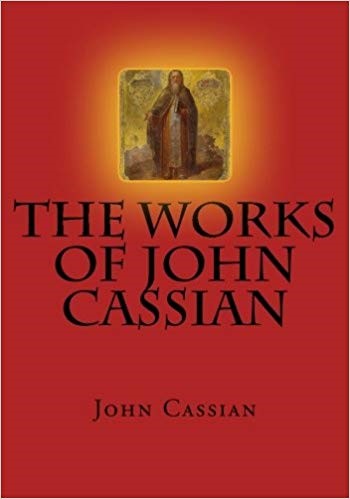– Anastasios
The monk John Cassian (360-435) was of great importance for the development of monasticism. He was indeed the first to introduce monasticism coming from the East (i.e., Egypt) in the West and in doing so he will have a deep influence on Saint Benedict of Norcia, the other great reformer of Western monasticism. John was founder of monasteries and a writer: “The two principal works of Cassian deal with the cenobitic life and the principal or deadly sins. They are entitled: De institutis coenobiorum et de octo principalium vitiorum remediis libri XII and Collationes XXIV. The former of these was written between 420 and 429. The relation between the two works is described by Cassian himself (Instit., II, 9) as follows: “These books [the Institutes] . . . are mainly taken up with what belongs to the outer man and the customs of the coenobia [i.e. Institutes of monastic life in common]; the others [the Collationes or Conferences] deal rather with the training of the inner man and the perfection of the heart.”
“The first four books of the Institutes treat of the rules governing the monastic life, illustrated by examples from the author’s personal observation in Egypt and Palestine; the eight remaining books are devoted to the eight principal obstacles to perfection encountered by monks: gluttony, impurity, covetousness, anger, dejection, accidia (ennui), vainglory, and pride. The Conferences contain a record of the conversations of Cassian and Germanus with the Egyptian solitaries, the subject being the interior life. It was composed in three parts. The first instalment (Books I-X) was dedicated to Bishop Leontius of Fréjus and a monk (afterwards bishop) named Helladius; the second (Books XI-XVII), to Honoratus of Arles and Eucherius of Lyons; the third (Books XVIII-XXIV), to the “holy brothers” Jovinian, Minervius, Leontius, and Theodore. These two works, especially the latter, were held in the highest esteem by his contemporaries and by several later founders of religious orders. St Benedict made use of Cassian in writing his Rule, and ordered selections from the Conferences, which he called a mirror of monasticism (speculum monasticum), to be read daily in his monasteries. Cassiodorus also recommended the Conferences to his monks, with reservations, however, relative to their author’s ideas on free will. On the other hand, the decree attributed to Pope Gelasius, De recipiendis et non recipiendis libris (early sixth century), censures this work as “apocryphal,” i.e. containing erroneous doctrines. An abridgment of the Conference was made by Eucherius of Lyons which we still possess (PL, L, 867 sqq.). A third work of Cassian, written at the request of the Roman Archdeacon Leo, afterwards Pope Leo the Great, about 430-431, was a defence of the orthodox doctrine against the errors of Nestorius: De Incarnatione Domini contra Nestorium (PL, L, 9-272). It appears to have been written hurriedly, and is, consequently, not of equal value with the other works of its author. A large part consists of proofs, drawn from the Scriptures, of Our Lord’s Divinity, and in support of the title of Mary to be regarded as the Mother of God; the author denounces Pelagianism as the source of the new heresy, which he regards as incompatible with the doctrine of the Trinity” (Hassett, M. (1908). John Cassian. In The Catholic Encyclopedia: http://www.newadvent.org/cathen/03404a.htm).
In his writings we find this description of the great danger that is the sign of anger: “In our fourth combat the deadly poison of anger has to be utterly rooted out from the inmost comers of our soul. For as long as this remains in our hearts, and blinds with its hurtful darkness the eye of the soul, we can neither acquire right judgment and discretion, nor gain the insight which springs from an honest gaze, or ripeness of counsel, nor can we be partakers of life, or retentive of righteousness, or even have the capacity for spiritual and true light: ‘for,’ says one, ‘mine eye is disturbed by reason of anger.’ Nor can we become partakers of wisdom, even though we are considered wise by universal consent, for ‘anger rests in the bosom of fools.’ Nor can we even attain immortal life, although we are accounted prudent in the opinion of everybody, for ‘anger destroys even the prudent.’ Nor shall we be able with clear judgment of heart to secure the controlling power of righteousness, even though we are reckoned perfect and holy in the estimation of all men, for ‘the wrath of man worketh not the righteousness of God.’ Nor can we by any possibility acquire that esteem and honour which is so frequently seen even in worldlings, even though we are thought noble and honorable through the privileges of birth, because ‘an angry man is dishonoured.’ Nor again can we secure any ripeness of counsel, even though we appear to be weighty, and endowed with the utmost knowledge; because ‘an angry man acts without counsel.’ Nor can we be free from dangerous disturbances, nor be without sin, even though no sort of disturbances be brought upon us by others; because ‘a passionate man engenders quarrels, but an angry man digs up sins.’”
We should really reconsider the deep wisdom coming from these early Christian writers.


 Follow
Follow


